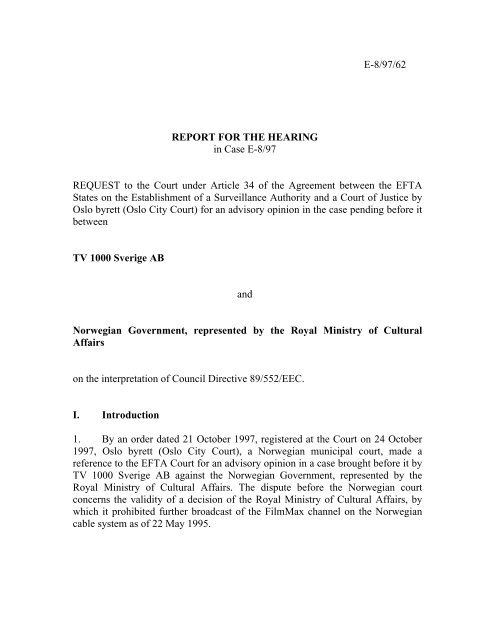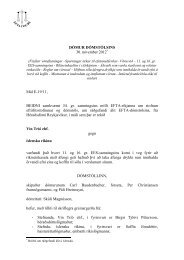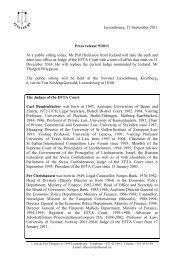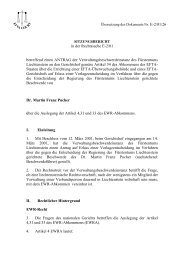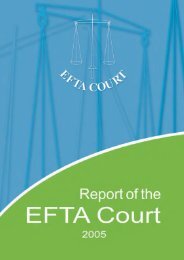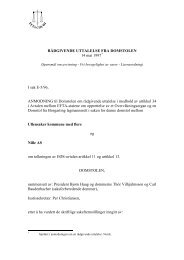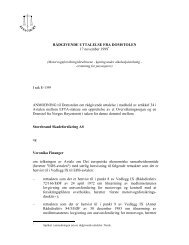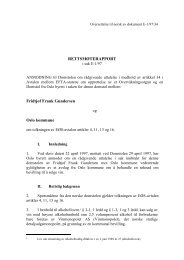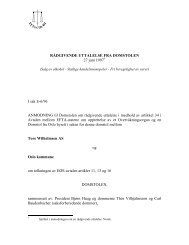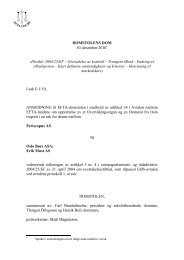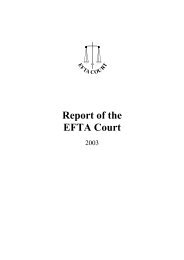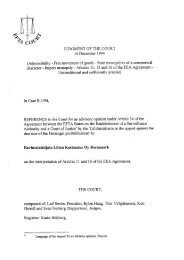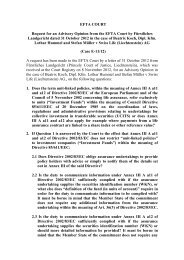Report for the Hearing in English - EFTA Court
Report for the Hearing in English - EFTA Court
Report for the Hearing in English - EFTA Court
Create successful ePaper yourself
Turn your PDF publications into a flip-book with our unique Google optimized e-Paper software.
REPORT FOR THE HEARING<br />
<strong>in</strong> Case E-8/97<br />
E-8/97/62<br />
REQUEST to <strong>the</strong> <strong>Court</strong> under Article 34 of <strong>the</strong> Agreement between <strong>the</strong> <strong>EFTA</strong><br />
States on <strong>the</strong> Establishment of a Surveillance Authority and a <strong>Court</strong> of Justice by<br />
Oslo byrett (Oslo City <strong>Court</strong>) <strong>for</strong> an advisory op<strong>in</strong>ion <strong>in</strong> <strong>the</strong> case pend<strong>in</strong>g be<strong>for</strong>e it<br />
between<br />
TV 1000 Sverige AB<br />
and<br />
Norwegian Government, represented by <strong>the</strong> Royal M<strong>in</strong>istry of Cultural<br />
Affairs<br />
on <strong>the</strong> <strong>in</strong>terpretation of Council Directive 89/552/EEC.<br />
I. Introduction<br />
1. By an order dated 21 October 1997, registered at <strong>the</strong> <strong>Court</strong> on 24 October<br />
1997, Oslo byrett (Oslo City <strong>Court</strong>), a Norwegian municipal court, made a<br />
reference to <strong>the</strong> <strong>EFTA</strong> <strong>Court</strong> <strong>for</strong> an advisory op<strong>in</strong>ion <strong>in</strong> a case brought be<strong>for</strong>e it by<br />
TV 1000 Sverige AB aga<strong>in</strong>st <strong>the</strong> Norwegian Government, represented by <strong>the</strong><br />
Royal M<strong>in</strong>istry of Cultural Affairs. The dispute be<strong>for</strong>e <strong>the</strong> Norwegian court<br />
concerns <strong>the</strong> validity of a decision of <strong>the</strong> Royal M<strong>in</strong>istry of Cultural Affairs, by<br />
which it prohibited fur<strong>the</strong>r broadcast of <strong>the</strong> FilmMax channel on <strong>the</strong> Norwegian<br />
cable system as of 22 May 1995.
II. Legal background<br />
National legislation<br />
- 2 -<br />
2. Accord<strong>in</strong>g to <strong>the</strong> request, <strong>the</strong> decision to stop FilmMax’s broadcasts was<br />
taken pursuant to section 4-5, first paragraph, litra b of Act No. 127 of 4 December<br />
1992 on broadcast<strong>in</strong>g (kr<strong>in</strong>gkast<strong>in</strong>gsloven, here<strong>in</strong>after <strong>the</strong> “Broadcast<strong>in</strong>g Act”).<br />
The provision entered <strong>in</strong>to <strong>for</strong>ce on 1 January 1994.<br />
3. Section 4-5, first paragraph, litra b of <strong>the</strong> Broadcast<strong>in</strong>g Act reads as follows:<br />
“The Mass Media Authority may prohibit fur<strong>the</strong>r broadcast by television stations<br />
which … broadcast programmes with pornography or violence <strong>in</strong> violation of<br />
Norwegian law.”<br />
4. Section 211 of <strong>the</strong> Norwegian General Civil Penal Code (straffeloven, Act<br />
no. 10 of 22 May 1902, here<strong>in</strong>after <strong>the</strong> “Penal Code”), last amended on 22 May<br />
1992, reads:<br />
“Any person shall be liable to f<strong>in</strong>es or imprisonment <strong>for</strong> a term not exceed<strong>in</strong>g two<br />
years, or to both, who<br />
a) gives public lectures or arranges public per<strong>for</strong>mances or exhibitions of an<br />
<strong>in</strong>decent or pornographic content,<br />
b) publishes, offers <strong>for</strong> sale or hire or <strong>in</strong> any o<strong>the</strong>r way seeks to dissem<strong>in</strong>ate,<br />
or with <strong>in</strong>tent to so dissem<strong>in</strong>ate, imports <strong>in</strong>decent or pornographic<br />
writ<strong>in</strong>gs, pictures, films, videograms or <strong>the</strong> like,<br />
c) delivers <strong>in</strong>decent or pornographic writ<strong>in</strong>gs, pictures, films, videograms or<br />
<strong>the</strong> like to persons under 18 years of age,<br />
d) possesses or imports pictures, films, videograms, or <strong>the</strong> like <strong>in</strong> which any<br />
person who is, must be considered to be or is presented as be<strong>in</strong>g under 16<br />
years of age is shown <strong>in</strong> an <strong>in</strong>decent or pornographic manner.<br />
In this section <strong>in</strong>decent or pornographic depictions mean sexual depictions<br />
that have an offensive effect or <strong>in</strong> any o<strong>the</strong>r way are capable of hav<strong>in</strong>g a humanly<br />
degrad<strong>in</strong>g or brutaliz<strong>in</strong>g effect, <strong>in</strong>clud<strong>in</strong>g sexual depictions show<strong>in</strong>g children,<br />
animals, violence, duress, and sadism.<br />
An accomplice shall be liable to <strong>the</strong> same penalty.<br />
Any person who negligently commits any such act as is referred to <strong>in</strong> this<br />
section shall be liable to f<strong>in</strong>es or imprisonment <strong>for</strong> a term not exceed<strong>in</strong>g six<br />
months or both.<br />
Any proprietor or superior who wilfully or negligently omits to prevent <strong>the</strong><br />
commission <strong>in</strong> his bus<strong>in</strong>ess of any such act is referred to <strong>in</strong> this section shall be<br />
liable to <strong>the</strong> same penalty.
EEA law<br />
- 3 -<br />
In <strong>the</strong> apportion<strong>in</strong>g of <strong>the</strong> sentence <strong>the</strong> fact that <strong>the</strong> <strong>in</strong>decent or<br />
pornographic depictions <strong>in</strong>clude <strong>the</strong> use of children, animals, violence, duress,<br />
and sadism shall be treated as an aggravat<strong>in</strong>g circumstance.<br />
This section shall not apply to films or videograms that <strong>the</strong> National<br />
Board of Film Censors has by prior control approved <strong>for</strong> commercial exhibition<br />
or sale.”<br />
5. Directive 89/552/EEC of 3 October 1989, on <strong>the</strong> coord<strong>in</strong>ation of certa<strong>in</strong><br />
provisions laid down by law, regulation or adm<strong>in</strong>istrative action <strong>in</strong> Member States<br />
concern<strong>in</strong>g <strong>the</strong> pursuit of television broadcast<strong>in</strong>g activities (here<strong>in</strong>after “<strong>the</strong><br />
Directive”) is referred to <strong>in</strong> po<strong>in</strong>t 1 of Annex X to <strong>the</strong> EEA Agreement.<br />
6. Article 2 of <strong>the</strong> Directive provides:<br />
“1. Each Member State shall ensure that all television broadcasts transmitted<br />
– by broadcasters under its jurisdiction, or<br />
– by broadcasters who, while not be<strong>in</strong>g under <strong>the</strong> jurisdiction of any<br />
Member State, make use of a frequency or a satellite capacity granted by,<br />
or a satellite up-l<strong>in</strong>k situated <strong>in</strong>, that Member State,<br />
comply with <strong>the</strong> law applicable to broadcasts <strong>in</strong>tended <strong>for</strong> <strong>the</strong> public <strong>in</strong> that<br />
Member State.<br />
2. Member States shall ensure freedom of reception and shall not restrict<br />
retransmission on <strong>the</strong>ir territory of television broadcasts from o<strong>the</strong>r<br />
Member States <strong>for</strong> reasons which fall with<strong>in</strong> <strong>the</strong> fields co-ord<strong>in</strong>ated by this<br />
Directive. Member States may provisionally suspend retransmissions of<br />
television broadcasts if <strong>the</strong> follow<strong>in</strong>g conditions are fulfilled:<br />
(a) a television broadcast com<strong>in</strong>g from ano<strong>the</strong>r Member State manifestly,<br />
seriously and gravely <strong>in</strong>fr<strong>in</strong>ges Article 22;<br />
(b) dur<strong>in</strong>g <strong>the</strong> previous 12 months, <strong>the</strong> broadcaster has <strong>in</strong>fr<strong>in</strong>ged <strong>the</strong> same<br />
provision on at least two prior occasions;<br />
(c) <strong>the</strong> Member State concerned has notified <strong>the</strong> broadcaster and <strong>the</strong><br />
Commission <strong>in</strong> writ<strong>in</strong>g of <strong>the</strong> alleged <strong>in</strong>fr<strong>in</strong>gements and of its <strong>in</strong>tention to<br />
restrict retransmission should any such <strong>in</strong>fr<strong>in</strong>gement occur aga<strong>in</strong>;
- 4 -<br />
(d) consultations with <strong>the</strong> transmitt<strong>in</strong>g State and <strong>the</strong> Commission have not<br />
produced an amicable settlement with<strong>in</strong> 15 days of <strong>the</strong> notification<br />
provided <strong>for</strong> <strong>in</strong> po<strong>in</strong>t (c), and <strong>the</strong> alleged <strong>in</strong>fr<strong>in</strong>gement persists.<br />
The Commission shall ensure that <strong>the</strong> suspension is compatible with Community<br />
law. It may ask <strong>the</strong> Member State concerned to put an end to a suspension which<br />
is contrary to Community law, as a matter of urgency. This provision is without<br />
prejudice to <strong>the</strong> application of any procedure, remedy or sanction to <strong>the</strong><br />
<strong>in</strong>fr<strong>in</strong>gements <strong>in</strong> question <strong>in</strong> <strong>the</strong> Member State which has jurisdiction over <strong>the</strong><br />
broadcaster concerned.<br />
3. This Directive shall not apply to broadcasts <strong>in</strong>tended exclusively <strong>for</strong><br />
reception <strong>in</strong> States o<strong>the</strong>r than Member States, and which are not received<br />
directly or <strong>in</strong>directly <strong>in</strong> one or more Member States.”<br />
7. Article 22 of <strong>the</strong> Directive provides:<br />
“Member States shall take appropriate measures to ensure that television<br />
broadcasts by broadcasters under <strong>the</strong>ir jurisdiction do not <strong>in</strong>clude programmes<br />
which might seriously impair <strong>the</strong> physical, mental or moral development of<br />
m<strong>in</strong>ors, <strong>in</strong> particular those that <strong>in</strong>volve pornography or gratuitous violence. This<br />
provision shall extend to o<strong>the</strong>r programmes which are likely to impair <strong>the</strong><br />
physical, mental or moral development of m<strong>in</strong>ors, except where it is ensured, by<br />
select<strong>in</strong>g <strong>the</strong> time of <strong>the</strong> broadcast or by any technical measure, that m<strong>in</strong>ors <strong>in</strong> <strong>the</strong><br />
area of transmission will not normally hear or see such broadcasts.<br />
Member States shall also ensure that broadcasts do not conta<strong>in</strong> any <strong>in</strong>citement to<br />
hatred on grounds of race, sex, religion or nationality.”<br />
8. Directive 97/36/EC of <strong>the</strong> European Parliament and of <strong>the</strong> Council of 30<br />
June 1997, amend<strong>in</strong>g Council Directive 89/552/EEC, has not yet been<br />
<strong>in</strong>corporated <strong>in</strong>to <strong>the</strong> EEA Agreement by a decision of <strong>the</strong> EEA Jo<strong>in</strong>t Committee.<br />
Article 1(2) of Directive 97/36/EC amends Article 2 and <strong>in</strong>serts a new Article 2a.<br />
The new Article 2a reads:<br />
“1. Member States shall ensure freedom of reception and shall not restrict<br />
retransmissions on <strong>the</strong>ir territory of television broadcasts from o<strong>the</strong>r Member<br />
States <strong>for</strong> reasons which fall with<strong>in</strong> <strong>the</strong> fields coord<strong>in</strong>ated by this Directive.<br />
2. Member States may, provisionally, derogate from paragraph 1 if <strong>the</strong> follow<strong>in</strong>g<br />
conditions are fulfilled:<br />
(a) a television broadcast com<strong>in</strong>g from ano<strong>the</strong>r Member State manifestly,<br />
seriously and gravely <strong>in</strong>fr<strong>in</strong>ges Article 22 (1) or (2) and/or Article 22a;
- 5 -<br />
(b) dur<strong>in</strong>g <strong>the</strong> previous 12 months, <strong>the</strong> broadcaster has <strong>in</strong>fr<strong>in</strong>ged <strong>the</strong><br />
provision(s) referred to <strong>in</strong> (a) on at least two prior occasions;<br />
(c) <strong>the</strong> Member State concerned has notified <strong>the</strong> broadcaster and <strong>the</strong><br />
Commission <strong>in</strong> writ<strong>in</strong>g of <strong>the</strong> alleged <strong>in</strong>fr<strong>in</strong>gements and of <strong>the</strong> measures it<br />
<strong>in</strong>tends to take should any such <strong>in</strong>fr<strong>in</strong>gement occur aga<strong>in</strong>;<br />
(d) consultations with <strong>the</strong> transmitt<strong>in</strong>g Member State and <strong>the</strong> Commission<br />
have not produced an amicable settlement with<strong>in</strong> 15 days of <strong>the</strong><br />
notification provided <strong>for</strong> <strong>in</strong> (c), and <strong>the</strong> alleged <strong>in</strong>fr<strong>in</strong>gement persists.<br />
The Commission shall, with<strong>in</strong> two months follow<strong>in</strong>g notification of <strong>the</strong> measures<br />
taken by <strong>the</strong> Member State, take a decision on whe<strong>the</strong>r <strong>the</strong> measures are<br />
compatible with Community law. If it decides that <strong>the</strong>y are not, <strong>the</strong> Member State<br />
will be required to put an end to <strong>the</strong> measures <strong>in</strong> question as a matter of urgency.<br />
3. Paragraph 2 shall be without prejudice to <strong>the</strong> application of any<br />
procedure, remedy or sanction to <strong>the</strong> <strong>in</strong>fr<strong>in</strong>gements <strong>in</strong> question <strong>in</strong> <strong>the</strong><br />
Member State which has jurisdiction over <strong>the</strong> broadcaster concerned.”<br />
Article 1(27) of Directive 97/36/EC amends Article 22 of Directive 89/552/EEC.<br />
The new Article 22 reads:<br />
“1. Member States shall take appropriate measures to ensure that television<br />
broadcasts by broadcasters under <strong>the</strong>ir jurisdiction do not <strong>in</strong>clude any<br />
programmes which might seriously impair <strong>the</strong> physical, mental or moral<br />
development of m<strong>in</strong>ors, <strong>in</strong> particular programmes that <strong>in</strong>volve<br />
pornography or gratuitous violence.<br />
2. The measures provided <strong>for</strong> <strong>in</strong> paragraph 1 shall also extend to o<strong>the</strong>r<br />
programmes which are likely to impair <strong>the</strong> physical, mental or moral<br />
development of m<strong>in</strong>ors, except where it is ensured, by select<strong>in</strong>g <strong>the</strong> time of<br />
<strong>the</strong> broadcast or by any technical measure, that m<strong>in</strong>ors <strong>in</strong> <strong>the</strong> area of<br />
transmission will not normally hear or see such broadcasts.<br />
3. Fur<strong>the</strong>rmore, when such programmes are broadcast <strong>in</strong> unencoded <strong>for</strong>m<br />
Member States shall ensure that <strong>the</strong>y are preceded by an acoustic warn<strong>in</strong>g<br />
or are identified by <strong>the</strong> presence of a visual symbol throughout <strong>the</strong>ir<br />
duration.”<br />
In addition, a new Article 22a now provides that Member States shall ensure that<br />
broadcasts do not conta<strong>in</strong> any <strong>in</strong>citement to hatred on grounds of race, sex,<br />
religion or nationality.
III. Facts and Procedure<br />
- 6 -<br />
9. TV 1000 Sverige AB is a Swedish broadcast<strong>in</strong>g company, which<br />
broadcasts on, <strong>in</strong>ter alia, <strong>the</strong> TV 1000 and FilmMax channels. Television<br />
programmes are broadcast from Sweden <strong>in</strong> <strong>the</strong> <strong>for</strong>m of satellite signals that are<br />
captured by Norwegian receiv<strong>in</strong>g stations. These are <strong>in</strong> turn l<strong>in</strong>ked to Norwegian<br />
cable systems, which broadcast <strong>the</strong> television signals to Norwegian homes. The<br />
broadcasts are encoded so that <strong>the</strong>y can only be received by pay<strong>in</strong>g subscribers.<br />
The television channels can also be received directly by subscribers with satellite<br />
dishes and decod<strong>in</strong>g equipment.<br />
10. Both TV 1000 and FilmMax have at times broadcast films with explicit<br />
sexual scenes. In <strong>the</strong>se cases, TV 1000 has placed a black square on <strong>the</strong> screen<br />
image which takes up about one-third of <strong>the</strong> screen surface. However, <strong>the</strong><br />
pornographic films were transmitted <strong>in</strong> uncensored <strong>for</strong>m on <strong>the</strong> FilmMax channel.<br />
As of 24.00 hrs on 16 September 1994, FilmMax broadcast <strong>the</strong> film “Andrew<br />
Blake’s girls”. As of 00.30 hrs on 17 September 1994, <strong>the</strong> film “The best of<br />
Andrew Blake” was broadcast. As of 23.30 hrs on 18 September 1994, <strong>the</strong> film “A<br />
Pussy called Wanda” was broadcast.<br />
11. The Norwegian Board of Film Classification (Statens Filmtilsyn), which is<br />
<strong>the</strong> adm<strong>in</strong>istrative body which assesses whe<strong>the</strong>r <strong>the</strong> content of films and<br />
videograms violate Norwegian legislation, found that all three films clearly<br />
violated section 211 of <strong>the</strong> Norwegian Penal Code.<br />
12. Based on this, <strong>the</strong> Norwegian Mass Media Authority (Statens<br />
medie<strong>for</strong>valtn<strong>in</strong>g) notified TV 1000 Sverige AB that <strong>the</strong> <strong>in</strong>tention was to take a<br />
decision to prohibit fur<strong>the</strong>r broadcast of FilmMax on Norwegian cable systems if<br />
FilmMax aga<strong>in</strong> broadcast films which were <strong>in</strong> violation of section 211 of <strong>the</strong> Penal<br />
Code. The notice was given on 24 October 1994 pursuant to section 16 of <strong>the</strong> Act<br />
of 10 February 1967 on procedure <strong>in</strong> cases concern<strong>in</strong>g <strong>the</strong> public adm<strong>in</strong>istration<br />
(<strong>the</strong> Public Adm<strong>in</strong>istration Act – <strong>for</strong>valtn<strong>in</strong>gsloven), which requires <strong>the</strong> Mass<br />
Media Authority to give such prior notice.<br />
13. On 10 November 1994, FilmMax broadcast <strong>the</strong> film “Just<strong>in</strong> et Juillet”. The<br />
Norwegian Board of Film Classification found that this film also clearly violated<br />
section 211 of <strong>the</strong> Norwegian Penal Code.<br />
14. Pursuant to Council Directive 89/552/EEC, Norwegian authorities notified<br />
<strong>the</strong> <strong>EFTA</strong> Surveillance Authority (ESA) of plans to <strong>in</strong>terrupt FilmMax’s<br />
broadcasts on Norwegian cable systems. Pursuant to Article 2(2)(d) of <strong>the</strong><br />
Directive, a consultation meet<strong>in</strong>g was held on 15 February 1995, with <strong>the</strong> <strong>EFTA</strong><br />
Surveillance Authority, Norwegian and Swedish authorities, as well as
- 7 -<br />
representatives from <strong>the</strong> EU Commission, without an amicable settlement be<strong>in</strong>g<br />
reached. In a report of <strong>the</strong> meet<strong>in</strong>g, <strong>the</strong> <strong>EFTA</strong> Surveillance Authority concluded<br />
that Norwegian authorities had fulfilled <strong>the</strong>ir obligations under <strong>the</strong> EEA<br />
Agreement. The <strong>EFTA</strong> Surveillance Authority found that all conditions were met<br />
<strong>for</strong> Norway to be able to take a decision on temporary <strong>in</strong>terruption of broadcasts of<br />
FilmMax on Norwegian cable systems.<br />
15. On 30 November 1994, <strong>the</strong> Mass Media Authority decided to prohibit <strong>the</strong><br />
broadcast of FilmMax on Norwegian cable systems as of 9 December 1994. On 21<br />
December 1994, TV 1000 Sverige AB, TV 1000 Norge AS, Norske<br />
Fjernsynsantenner AS and Mr E<strong>in</strong>ar Brustad filed a compla<strong>in</strong>t aga<strong>in</strong>st <strong>the</strong> decision<br />
of <strong>the</strong> Mass Media Authority with <strong>the</strong> Norwegian Royal M<strong>in</strong>istry of Cultural<br />
Affairs. Norske Fjernsynsantenner is a cable company that distributes television<br />
signals through a separate system, and Mr E<strong>in</strong>ar Brustad was a subscriber to<br />
FilmMax. On 15 May 1995, <strong>the</strong> Norwegian Royal M<strong>in</strong>istry of Cultural Affairs<br />
made a decision on <strong>the</strong> compla<strong>in</strong>t, which was to prohibit fur<strong>the</strong>r broadcasts of<br />
FilmMax as of 22 May 1995 as of 24.00 hrs.<br />
16. Be<strong>for</strong>e <strong>the</strong> national court, <strong>the</strong> pla<strong>in</strong>tiff, TV 1000 Sverige AB, has argued<br />
that <strong>the</strong> decision of 15 May 1995 by <strong>the</strong> M<strong>in</strong>istry of Cultural Affairs suffers from<br />
shortcom<strong>in</strong>gs relat<strong>in</strong>g to competence and content, which render <strong>the</strong> decision<br />
<strong>in</strong>valid. The pla<strong>in</strong>tiff has argued that Norway is subject to Directive 89/552/EEC,<br />
and that section 4-5, litra b, of <strong>the</strong> Broadcast<strong>in</strong>g Act, on which <strong>the</strong> decision is<br />
based, must be <strong>in</strong>terpreted as hav<strong>in</strong>g <strong>the</strong> same mean<strong>in</strong>g as Article 2, cf. Article 22<br />
of <strong>the</strong> Directive.<br />
17. Oslo byrett, consider<strong>in</strong>g that Article 22, first sentence of Council Directive<br />
89/552/EEC may raise questions as to whe<strong>the</strong>r <strong>the</strong> provision leaves it up to <strong>the</strong><br />
<strong>in</strong>dividual EU/<strong>EFTA</strong> country to determ<strong>in</strong>e <strong>the</strong> degree of pornography, violence,<br />
etc., which can be deemed to seriously impair <strong>the</strong> physical, mental or moral<br />
development of m<strong>in</strong>ors, or whe<strong>the</strong>r <strong>the</strong> Directive seeks to <strong>in</strong>troduce a common EU<br />
standard with respect to what is to be accepted <strong>in</strong> terms of pornography, violence,<br />
etc., <strong>in</strong> <strong>the</strong> European Economic Area, has decided to refer a request to <strong>the</strong> <strong>EFTA</strong><br />
<strong>Court</strong> to obta<strong>in</strong> an advisory op<strong>in</strong>ion on certa<strong>in</strong> questions.<br />
IV. Questions<br />
18. The follow<strong>in</strong>g questions were referred to <strong>the</strong> <strong>EFTA</strong> <strong>Court</strong>:<br />
1. Does Article 22, first sentence of Council Directive 89/552/EEC<br />
<strong>in</strong>troduce a common standard <strong>for</strong> what “might seriously impair<br />
<strong>the</strong> physical, mental or moral development of m<strong>in</strong>ors” or is it left<br />
up to each <strong>in</strong>dividual EU and <strong>EFTA</strong> country to determ<strong>in</strong>e <strong>the</strong>
- 8 -<br />
degree of pornography, violence, etc., which is to be deemed to<br />
have <strong>the</strong> damag<strong>in</strong>g effects referred to <strong>in</strong> Article 22?<br />
2. In <strong>the</strong> event that Article 22, first sentence of Council Directive<br />
89/552/EEC establishes a common standard <strong>for</strong> <strong>the</strong> European<br />
Economic Area: is <strong>the</strong> Swedish norm which accepts scenes shot<br />
<strong>in</strong> close-ups with masturbation, lick<strong>in</strong>g and suck<strong>in</strong>g of sexual<br />
organs, <strong>in</strong>tercourse, dwell<strong>in</strong>g on ejaculation <strong>in</strong> <strong>the</strong> mouths of<br />
women and group sex an expression of <strong>the</strong> common norm <strong>in</strong><br />
Article 22 which is to apply <strong>for</strong> <strong>the</strong> European Economic Area?<br />
3. Can <strong>the</strong> provision <strong>in</strong> Article 22, first paragraph, second sentence<br />
of Council Directive 89/552/EEC concern<strong>in</strong>g <strong>the</strong> choice of<br />
broadcast time and technical measures apply to circumstances<br />
which are to be subsumed under Article 22, first paragraph, first<br />
sentence?<br />
4. If a film is deemed to be contrary to Article 22, first paragraph,<br />
first sentence of Council Directive 89/552/EEC, is Article 2(2)(a)<br />
a fur<strong>the</strong>r impediment to <strong>the</strong> temporary <strong>in</strong>terruption of fur<strong>the</strong>r<br />
broadcast of television broadcasts under Article 2(2)?<br />
5. Are repeated acts contrary to Article 22 of <strong>the</strong> TV Directive to be<br />
subsumed under Article 2(2) (a) or (b)?<br />
V. Written observations<br />
19. Pursuant to Article 20 of <strong>the</strong> Statue of <strong>the</strong> <strong>EFTA</strong> <strong>Court</strong> and Article 97 of<br />
<strong>the</strong> Rules of Procedure, written observations have been received from:<br />
– <strong>the</strong> pla<strong>in</strong>tiff, represented by Counsel Mr Birger Nilsen, Advokatfirma<br />
Meltvedt & Co., Oslo;<br />
– <strong>the</strong> defendant, represented by <strong>the</strong> Office of <strong>the</strong> Attorney General (Civil<br />
Affairs), represented by Ms Bergljot Webster;<br />
– <strong>the</strong> Government of Sweden, represented by Mr Erik Brattgård, act<strong>in</strong>g as<br />
Agent;<br />
– <strong>the</strong> Government of <strong>the</strong> United K<strong>in</strong>gdom, represented by Mr J.E. Coll<strong>in</strong>s,<br />
act<strong>in</strong>g as Agent, and Mr Rhodri Thompson, Barrister;
- 9 -<br />
– <strong>the</strong> <strong>EFTA</strong> Surveillance Authority, represented by Ms Helga Óttarsdóttir,<br />
Officer, Legal & Executive Affairs, act<strong>in</strong>g as Agent;<br />
– <strong>the</strong> Commission of <strong>the</strong> European Communities, represented by Ms Karen<br />
Banks, Member of its Legal Service, act<strong>in</strong>g as Agent.<br />
TV 1000 Sverige AB<br />
20. The pla<strong>in</strong>tiff submits that, pursuant to Article 2(1) of <strong>the</strong> Directive, Swedish<br />
authorities are to ensure that <strong>the</strong> television programmes <strong>in</strong> question comply with<br />
<strong>the</strong> applicable national law. The pla<strong>in</strong>tiff refers to <strong>the</strong> Preamble to <strong>the</strong> Directive <strong>in</strong><br />
support of <strong>the</strong> view that it is <strong>for</strong> <strong>the</strong> transmitt<strong>in</strong>g State to ensure that broadcasts<br />
comply with national law as co-ord<strong>in</strong>ated by <strong>the</strong> Directive, without secondary<br />
control on <strong>the</strong> same grounds <strong>in</strong> <strong>the</strong> receiv<strong>in</strong>g State. This is sufficient under<br />
Community law to ensure free movement of broadcasts.<br />
21. All of <strong>the</strong> relevant films broadcast on FilmMax have been approved by<br />
Swedish authorities. No objections have been made as to <strong>the</strong> content of <strong>the</strong><br />
broadcasts <strong>in</strong> o<strong>the</strong>r Nordic countries which receive broadcasts from FilmMax.<br />
22. The pla<strong>in</strong>tiff submits that <strong>the</strong> discretion provided <strong>for</strong> <strong>in</strong> Article 22 of <strong>the</strong><br />
Directive concerns whe<strong>the</strong>r “programmes which might seriously impair <strong>the</strong><br />
physical, mental or moral development of m<strong>in</strong>ors, <strong>in</strong> particular those that <strong>in</strong>volve<br />
pornography or gratuitous violence” may be broadcast. Fur<strong>the</strong>r, <strong>the</strong> pla<strong>in</strong>tiff<br />
submits, <strong>the</strong> provision applies “except where it is ensured, by select<strong>in</strong>g <strong>the</strong> time of<br />
<strong>the</strong> broadcast or by any technical measure, that m<strong>in</strong>ors <strong>in</strong> <strong>the</strong> area of transmission<br />
will not normally hear or see such broadcasts.”<br />
23. In approv<strong>in</strong>g <strong>the</strong> films broadcast on FilmMax, Swedish authorities have<br />
found that <strong>the</strong> films cannot seriously impair <strong>the</strong> physical, mental or moral<br />
development of m<strong>in</strong>ors. It is submitted that <strong>the</strong> physical, mental and moral<br />
development of Norwegian m<strong>in</strong>ors cannot be seriously impaired by films which<br />
do not have such an effect on Swedish m<strong>in</strong>ors. The films <strong>in</strong> question show actions<br />
between human be<strong>in</strong>gs which are permitted. If <strong>the</strong> films were to be found to<br />
seriously impair <strong>the</strong> development of m<strong>in</strong>ors, <strong>the</strong> pla<strong>in</strong>tiff stresses that through <strong>the</strong><br />
tim<strong>in</strong>g of <strong>the</strong> broadcast and through technical measures it is ensured that m<strong>in</strong>ors <strong>in</strong><br />
<strong>the</strong> area will not normally hear or see <strong>the</strong> broadcasts. The films <strong>in</strong> question were<br />
broadcast start<strong>in</strong>g as of midnight, and an active action is required from <strong>the</strong><br />
subscriber <strong>in</strong> <strong>the</strong> order<strong>in</strong>g of <strong>the</strong> subscription and <strong>the</strong> payment of <strong>the</strong> fee.<br />
Additionally, a decoder is necessary to be able to receive <strong>the</strong> television signals; it<br />
normally has an <strong>in</strong>terruption mechanism which allows <strong>the</strong> decoder to be blocked<br />
<strong>for</strong> use by m<strong>in</strong>ors.
- 10 -<br />
24. In any event, <strong>the</strong> pla<strong>in</strong>tiff argues that <strong>the</strong> films at issue do not manifestly,<br />
seriously and gravely <strong>in</strong>fr<strong>in</strong>ge Article 22, cf. Article 2(2)(a) of <strong>the</strong> Directive. To<br />
suspend retransmissions of broadcasts under Article 2(2) of <strong>the</strong> Directive, a<br />
qualified <strong>in</strong>fr<strong>in</strong>gement of Article 22 is required. No such <strong>in</strong>fr<strong>in</strong>gement can be<br />
established <strong>in</strong> <strong>the</strong> case at hand.<br />
The Norwegian Government<br />
25. The defendant, <strong>the</strong> Norwegian Government, stresses that, under Norwegian<br />
law, films with a strong emphasis on sexual organs <strong>in</strong> a sexual context and which<br />
are aimed at be<strong>in</strong>g sexually excit<strong>in</strong>g <strong>for</strong> <strong>the</strong> viewer are usually beyond what may<br />
be acceptable under section 211 of <strong>the</strong> Norwegian Penal Code. The defendant<br />
refers to three Supreme <strong>Court</strong> judgments which establish this. The judgments are<br />
published <strong>in</strong> Norsk Rettstidende 1978:1111, 1984:1016 and 1987:1537.<br />
26. The defendant fur<strong>the</strong>r stresses that, when <strong>the</strong> new Broadcast<strong>in</strong>g Act was<br />
enacted <strong>in</strong> 1992, <strong>the</strong> legislator stated that Norwegian law was <strong>in</strong> accordance with<br />
Directive 89/552/EEC, and <strong>the</strong> majority of <strong>the</strong> parliamentary committee deal<strong>in</strong>g<br />
with <strong>the</strong> Act stated that <strong>the</strong> EEA Agreement did not give rise to a need to amend<br />
Norwegian legislation on pornography, which television programmes broadcast on<br />
cable systems <strong>in</strong> Norway must not violate.<br />
27. The defendant <strong>in</strong>terprets <strong>the</strong> Directive to <strong>the</strong> effect that a receiv<strong>in</strong>g State<br />
may not carry out fur<strong>the</strong>r controls <strong>in</strong> addition to those effected by <strong>the</strong> transmitt<strong>in</strong>g<br />
State, except <strong>in</strong> certa<strong>in</strong> limited circumstances, when a receiv<strong>in</strong>g State may<br />
implement controls and sanctions <strong>in</strong> <strong>the</strong> <strong>for</strong>m of temporary suspension of <strong>the</strong><br />
broadcast, pursuant to Article 2(2), second sentence.<br />
28. The defendant submits that <strong>the</strong> word<strong>in</strong>g of Article 22 of <strong>the</strong> Directive<br />
implies that <strong>the</strong> Directive assumes that pornography can seriously impair <strong>the</strong><br />
“physical, mental and moral development” of m<strong>in</strong>ors. It is <strong>the</strong>re<strong>for</strong>e not necessary<br />
to prove that pornography actually may have such an effect on children. The<br />
essential question is what is to be def<strong>in</strong>ed as pornography. The defendant submits<br />
that, subject to certa<strong>in</strong> limits, it must be up to <strong>the</strong> Member States to establish that<br />
def<strong>in</strong>ition. It was never <strong>the</strong> <strong>in</strong>tention to co-ord<strong>in</strong>ate through <strong>the</strong> Directive <strong>the</strong><br />
concept of pornography <strong>for</strong> all Member States. No attempts have been made to<br />
harmonize similar standards <strong>in</strong> o<strong>the</strong>r areas of EC law (Case C-34/79 Reg<strong>in</strong>a v<br />
Henn and Darby [1979] ECR 3795 and Case C-121/85 Conegate v HM Customs<br />
& Excise [1986] ECR 1007.
- 11 -<br />
29. The defendant submits that <strong>the</strong> effects to be avoided are <strong>the</strong> impairment of<br />
children’s mental and moral development, both of which are dependent upon <strong>the</strong><br />
cultural environment. The Directive gives <strong>the</strong> Member States a marg<strong>in</strong> of<br />
appreciation, subject to certa<strong>in</strong> limits. The defendant submits that <strong>the</strong>re is a lower<br />
limit <strong>for</strong> <strong>the</strong> concept of “pornography” under <strong>the</strong> Directive, below which a case<br />
must be considered under <strong>the</strong> second sentence of Article 22, <strong>for</strong> which <strong>the</strong> harm to<br />
m<strong>in</strong>ors need not be serious <strong>for</strong> a violation to be found. The Directive also implies<br />
an upper limit <strong>for</strong> what a State may allow to be broadcast, without violat<strong>in</strong>g <strong>the</strong><br />
obligation to <strong>in</strong>tervene aga<strong>in</strong>st pornographic broadcasts. The defendant submits<br />
that <strong>the</strong> films <strong>in</strong> question clearly exceed <strong>the</strong> lower limit under <strong>the</strong> Directive and<br />
that <strong>the</strong>re can be no doubt that <strong>the</strong> films referred to are of such a nature that a State<br />
must be able to characterize <strong>the</strong>m as be<strong>in</strong>g pornographic with<strong>in</strong> <strong>the</strong> mean<strong>in</strong>g of <strong>the</strong><br />
Directive.<br />
30. The defendant proposes <strong>the</strong> follow<strong>in</strong>g answers to <strong>the</strong> questions:<br />
“Question 1:<br />
Council Directive 89/552/EEC is to be <strong>in</strong>terpreted as not <strong>in</strong>troduc<strong>in</strong>g a common<br />
standard <strong>for</strong> what “might seriously impair <strong>the</strong> physical, mental or moral<br />
development of m<strong>in</strong>ors”. Each EU and <strong>EFTA</strong> State must determ<strong>in</strong>e <strong>the</strong> degree of<br />
pornography, violence, etc., which is to be deemed to have <strong>the</strong> damag<strong>in</strong>g effects<br />
referred to <strong>in</strong> Article 22.”<br />
Question 2:<br />
If <strong>the</strong> <strong>Court</strong> replies to question 1 by determ<strong>in</strong><strong>in</strong>g that Article 22 establishes a<br />
common standard:<br />
The Swedish norm is not an expression of <strong>the</strong> common norm <strong>in</strong>troduced by Article<br />
22.<br />
Question 3:<br />
The provision <strong>in</strong> Article 22, first paragraph, second sentence of Council Directive<br />
89/552/EEC does not apply to circumstances which are to be subsumed under<br />
Article 22, first paragraph, first sentence.<br />
Question 4:<br />
Article 2(2)(a) imposes fur<strong>the</strong>r requirements, <strong>in</strong> addition to <strong>the</strong> requirements<br />
follow<strong>in</strong>g from Article 22, that must be fulfilled be<strong>for</strong>e a Member State may effect<br />
temporary suspensions of broadcasts. Whe<strong>the</strong>r <strong>the</strong>se requirements are fulfilled<br />
must be assessed accord<strong>in</strong>g to that State’s <strong>in</strong>ternal norms.<br />
Question 5:<br />
Repeated <strong>in</strong>fr<strong>in</strong>gements of Article 22 of Council Directive 89/552/EEC may be<br />
subsumed both under Article 2(2)(a) and (b), <strong>in</strong> so far as <strong>the</strong> rema<strong>in</strong><strong>in</strong>g conditions<br />
are met.”
The Government of Sweden<br />
- 12 -<br />
31. The Government of Sweden submits written observations only as to <strong>the</strong> first<br />
question. The Government of Sweden po<strong>in</strong>ts out that <strong>the</strong> Directive does not<br />
conta<strong>in</strong> a harmonized def<strong>in</strong>ition of terms such as “pornography”, “gratuitous<br />
violence” or “which might seriously impair <strong>the</strong> physical, mental or moral<br />
development of m<strong>in</strong>ors”, as conta<strong>in</strong>ed <strong>in</strong> Article 22 of <strong>the</strong> Directive. The<br />
Government refers to judgment of <strong>the</strong> ECJ <strong>in</strong> Case 34/79, Reg<strong>in</strong>a v Henn and<br />
Darby (cited above) on <strong>the</strong> <strong>in</strong>terpretation of <strong>the</strong> term “public morality” <strong>in</strong> Article<br />
36 EC, <strong>the</strong> case hav<strong>in</strong>g established that, <strong>in</strong> pr<strong>in</strong>ciple, it is <strong>for</strong> each Member State to<br />
determ<strong>in</strong>e <strong>the</strong> requirements of public morality <strong>in</strong> its territory, <strong>in</strong> accordance with<br />
its own scale of values and <strong>in</strong> <strong>the</strong> <strong>for</strong>m selected by it. The Government of Sweden<br />
fur<strong>the</strong>r refers to judgments of <strong>the</strong> European <strong>Court</strong> of Human Rights, where it is<br />
stated that it is not possible to determ<strong>in</strong>e a uni<strong>for</strong>m European conception of<br />
morals, and that <strong>the</strong> requirements of morals vary from time to time and from place<br />
to place (see <strong>the</strong> Handyside Case, Judgment of 7 December 1976 (Series A Vol.<br />
24); <strong>the</strong> Case of Müller and O<strong>the</strong>rs, Judgment of 24 May 1988 (Series A Vol.<br />
133); and <strong>the</strong> Otto-Prem<strong>in</strong>ger-Institute Case, Judgment of 20 September 1994<br />
(Series A Vol. 295).<br />
32. The Government of Sweden concludes that it is, <strong>in</strong> pr<strong>in</strong>ciple, <strong>for</strong> <strong>the</strong><br />
<strong>in</strong>dividual Member State to determ<strong>in</strong>e, <strong>in</strong> accordance with its own scale of values,<br />
which programmes can, accord<strong>in</strong>g to Article 22, paragraph 1, seriously impair <strong>the</strong><br />
physical, mental or moral development of m<strong>in</strong>ors.<br />
The Government of <strong>the</strong> United K<strong>in</strong>gdom<br />
33. The Government of <strong>the</strong> United K<strong>in</strong>gdom supports <strong>the</strong> submissions of <strong>the</strong><br />
defendant. It is submitted that <strong>the</strong> questions referred to <strong>the</strong> <strong>EFTA</strong> <strong>Court</strong> raise two<br />
issues: first, what test is to be applied by national authorities of an EEA State <strong>in</strong><br />
determ<strong>in</strong><strong>in</strong>g whe<strong>the</strong>r a programme conta<strong>in</strong><strong>in</strong>g pornographic material received<br />
from ano<strong>the</strong>r EEA State, where such material is not prohibited, <strong>for</strong> <strong>the</strong> purposes of<br />
retransmission by cable, “manifestly, seriously and gravely <strong>in</strong>fr<strong>in</strong>ges Article 22 of<br />
<strong>the</strong> Directive” (Questions 1, 2, 4 and 5) and, second, whe<strong>the</strong>r <strong>the</strong> prohibition <strong>in</strong><br />
Article 22(1), first sentence applies where a broadcaster ensures, by selection of<br />
time or by a technical measure, that m<strong>in</strong>ors <strong>in</strong> <strong>the</strong> area of transmission will not<br />
normally hear or see such broadcasts (Question 3).
Questions 1, 2, 4 and 5<br />
- 13 -<br />
34. As regards <strong>the</strong> first issue, <strong>the</strong> Government of <strong>the</strong> United K<strong>in</strong>gdom notes<br />
that Article 2(2) of <strong>the</strong> Directive imposes a general prohibition on secondary<br />
control by <strong>the</strong> national authorities of one EEA State of broadcasts from o<strong>the</strong>r EEA<br />
States. This applies even where a receiv<strong>in</strong>g State considers that authorities<br />
responsible <strong>for</strong> control over broadcast <strong>in</strong> <strong>the</strong> transmitt<strong>in</strong>g State have failed to<br />
exercize <strong>the</strong> degree of control required under <strong>the</strong> Directive (Case C-11/95<br />
Commission v Belgium [1996] ECR I-4155; Case C-14/96 Denuit [1997] ECR I-<br />
2785).<br />
35. However, <strong>in</strong> specific circumstances an exceptional procedure is allowed <strong>for</strong><br />
as envisaged <strong>in</strong> <strong>the</strong> 15 th recital of <strong>the</strong> Preamble to <strong>the</strong> Directive and implemented<br />
<strong>in</strong> Article 2(2) of <strong>the</strong> Directive, which <strong>in</strong> turn refers to Article 22. The Government<br />
of <strong>the</strong> United K<strong>in</strong>gdom notes that <strong>the</strong> answers to <strong>the</strong> questions referred to <strong>the</strong><br />
<strong>EFTA</strong> <strong>Court</strong> are not affected by amendments to Articles 2 and 22 by Directive<br />
97/36/EC of 30 June 1997, although <strong>the</strong> answer to question 3 is clarified by <strong>the</strong><br />
amendments to Article 22.<br />
36. The Directive is enacted pursuant to Articles 57(2) and 66 of <strong>the</strong> EC Treaty<br />
and is thus subject to Article 56(1), which provides <strong>for</strong> derogations from <strong>the</strong> free<br />
movement of services by <strong>the</strong> Member States on grounds of “public policy, public<br />
security and public health”. The protection of m<strong>in</strong>ors is a fundamental issue of<br />
public policy, rightly recognized by <strong>the</strong> Directive as a matter <strong>for</strong> <strong>the</strong> <strong>in</strong>dividual<br />
EEA States to regulate <strong>in</strong> accordance with <strong>in</strong>dividual traditions and specific<br />
conditions prevail<strong>in</strong>g <strong>in</strong> <strong>the</strong>ir territories.<br />
37. The Government of <strong>the</strong> United K<strong>in</strong>gdom submits that <strong>the</strong>re is no uni<strong>for</strong>m<br />
standard of morality throughout <strong>the</strong> EEA <strong>in</strong> relation to issues of this k<strong>in</strong>d. The<br />
Government fur<strong>the</strong>r submits that case law of <strong>the</strong> EC <strong>Court</strong> of Justice <strong>in</strong> relation to<br />
derogations from freedom of movement is relevant <strong>in</strong> relation to issues specified<br />
under Article 22 of <strong>the</strong> Directive. Like any secondary legislation, <strong>the</strong> Directive<br />
must be <strong>in</strong>terpreted <strong>in</strong> <strong>the</strong> light of <strong>the</strong> Treaty rules on free movement of services,<br />
<strong>in</strong> particular Article 56 of <strong>the</strong> Treaty (Jo<strong>in</strong>ed Cases C-427/93, 429/93 and 436/96<br />
Bristol-Myers Squibb and o<strong>the</strong>rs v Paranova [1996] ECR I-3457, at para. 27).<br />
38. The same general pr<strong>in</strong>ciple applies <strong>in</strong> <strong>the</strong> context of <strong>the</strong> free movement of<br />
services as <strong>in</strong> <strong>the</strong> context of free movement of goods, viz. that Member States have<br />
a legitimate <strong>in</strong>terest <strong>in</strong> controll<strong>in</strong>g obscene material be<strong>in</strong>g imported <strong>in</strong>to <strong>the</strong>ir<br />
territory (Case 34/79 Reg<strong>in</strong>a v Henn and Darby (cited above) at para. 21). This is<br />
confirmed by Case C-288/89 Collectieve Antennevoorzien<strong>in</strong>g Gouda [1991] ECR<br />
I-4007 at paras. 22-23, and Case C-353/89 Commission v Ne<strong>the</strong>rlands [1991] ECR<br />
I-4069, at paras. 29-30. The Government of <strong>the</strong> United K<strong>in</strong>gdom submits that
- 14 -<br />
rules <strong>in</strong> relation to <strong>the</strong> protection of m<strong>in</strong>ors aga<strong>in</strong>st exposure to pornography<br />
pla<strong>in</strong>ly fall with<strong>in</strong> <strong>the</strong> scope of this pr<strong>in</strong>ciple and po<strong>in</strong>ts out that a similar pr<strong>in</strong>ciple<br />
has been applied by <strong>the</strong> European <strong>Court</strong> of Human Rights (Handyside (cited<br />
above), at para. 48).<br />
39. The Government of <strong>the</strong> United K<strong>in</strong>gdom submits that <strong>the</strong> only<br />
<strong>in</strong>terpretation of Articles 2(2) and 22 that would accord with general pr<strong>in</strong>ciples of<br />
Community law and <strong>the</strong> satisfactory construction of <strong>the</strong> Directive is that <strong>the</strong><br />
national authorities of <strong>the</strong> receiv<strong>in</strong>g State should apply Article 2(2) by reference to<br />
<strong>the</strong> measures that it has adopted pursuant to its obligations under Article 22. The<br />
question of whe<strong>the</strong>r o<strong>the</strong>r States, <strong>in</strong>clud<strong>in</strong>g <strong>the</strong> transmitt<strong>in</strong>g State, have ei<strong>the</strong>r more<br />
liberal or more str<strong>in</strong>gent rules, is irrelevant to <strong>the</strong> <strong>in</strong>terpretation of Article 2(2)(a).<br />
The Government <strong>in</strong> particular draws attention to <strong>the</strong> follow<strong>in</strong>g: (1) Article 22 is<br />
not addressed to <strong>in</strong>dividual broadcasters; (2) it would be contrary to pr<strong>in</strong>ciple <strong>for</strong><br />
<strong>the</strong> Norwegian authorities to be required to construe Swedish law; (3) if<br />
Norwegian authorities were of <strong>the</strong> op<strong>in</strong>ion that Swedish law was <strong>in</strong>fr<strong>in</strong>ged, <strong>the</strong><br />
proper remedy would be to br<strong>in</strong>g <strong>the</strong> matter to <strong>the</strong> attention of <strong>the</strong> Commission or<br />
<strong>the</strong> EEA Jo<strong>in</strong>t Committee; (4) no such action is provided <strong>for</strong> by <strong>the</strong> tailpiece to<br />
Article 2(2); (5) discretion is conferred on both Norwegian and Swedish<br />
authorities as regards “appropriate measures” <strong>in</strong> Article 22, and it cannot be<br />
expected that <strong>the</strong> measures are <strong>the</strong> same; and (6) it appears that both Norwegian<br />
and Swedish law are considered by <strong>the</strong> competent EC and EEA authorities to<br />
comply with Article 22.<br />
40. As regards <strong>the</strong> conditions laid down <strong>in</strong> Article 2(2), <strong>the</strong> Government of <strong>the</strong><br />
United K<strong>in</strong>gdom submits that it is true that, as a matter of general pr<strong>in</strong>ciple, that<br />
Article 56, and <strong>in</strong> particular <strong>the</strong> public policy exception recognized <strong>the</strong>reunder<br />
must be <strong>in</strong>terpreted restrictively. The position under Articles 2(2) and 22 is<br />
different. The effect of <strong>the</strong>se provisions is to replace <strong>the</strong> general pr<strong>in</strong>ciples by a<br />
<strong>for</strong>mal procedure, applicable only under very restrictive conditions and under<br />
supervision by <strong>the</strong> Commission, whereby <strong>the</strong> EEA States reta<strong>in</strong> a residual national<br />
competence to control television programmes of particular sensitivity.<br />
41. Under Article 2(2) (a) and (b), <strong>the</strong> receiv<strong>in</strong>g EEA State must assess <strong>the</strong><br />
material by reference to its own national rules and on <strong>the</strong> same basis as it would<br />
apply to material broadcast by a domestic broadcaster. Its right to provisionally<br />
suspend broadcasts arises where material of this k<strong>in</strong>d has been broadcast three<br />
times with<strong>in</strong> a 12-month period. The United K<strong>in</strong>gdom submits, <strong>in</strong> answer to <strong>the</strong><br />
fifth question, that <strong>the</strong> fact that material is repeatedly broadcast is not to be taken<br />
<strong>in</strong>to account under Article 2(2)(a), as <strong>the</strong> provision is directed at <strong>the</strong> nature of <strong>the</strong><br />
material conta<strong>in</strong>ed <strong>in</strong> a broadcast. Under Article 2(2)(b) <strong>the</strong> jurisdiction of a<br />
receiv<strong>in</strong>g State to adopt suspensory measures does not arise until it has identified<br />
three occasions with<strong>in</strong> a 12- month period dur<strong>in</strong>g which a s<strong>in</strong>gle broadcaster has
- 15 -<br />
<strong>in</strong>fr<strong>in</strong>ged <strong>the</strong> national measures adopted pursuant to Article 22 <strong>in</strong> <strong>the</strong> manner laid<br />
down by Article 2(2)(a).<br />
Question 3<br />
42. As regards <strong>the</strong> issue raised by <strong>the</strong> third question, <strong>the</strong> Government of <strong>the</strong><br />
United K<strong>in</strong>gdom refers to its submissions <strong>in</strong> Case C-327/93 R v Secretary of State<br />
<strong>for</strong> National Heritage ex parte Cont<strong>in</strong>ental Television Bvio and o<strong>the</strong>rs 1 at section<br />
4.2, and to <strong>the</strong> amendments to Article 22 <strong>in</strong> Directive 97/36, designed to put this<br />
matter beyond doubt by separat<strong>in</strong>g <strong>the</strong> two sentences orig<strong>in</strong>ally conta<strong>in</strong>ed <strong>in</strong><br />
Article 22. The Government of <strong>the</strong> United K<strong>in</strong>gdom proposes <strong>the</strong> follow<strong>in</strong>g<br />
answer to <strong>the</strong> third question:<br />
“The exception conta<strong>in</strong>ed <strong>in</strong> <strong>the</strong> second sentence of Article 22, first paragraph –<br />
whereby programmes “which are likely to impair <strong>the</strong> physical, mental or moral<br />
development of m<strong>in</strong>ors” are not subject to <strong>the</strong> prohibition provided <strong>for</strong> <strong>in</strong> <strong>the</strong> first<br />
sentence of Article 22, first paragraph, “where it is ensured, by select<strong>in</strong>g <strong>the</strong> time<br />
of <strong>the</strong> broadcast or by any technical measure, that m<strong>in</strong>ors <strong>in</strong> <strong>the</strong> area of<br />
transmission will not normally hear or see such broadcasts” – does not extend to<br />
programmes “which might seriously impair <strong>the</strong> physical, mental or moral<br />
development of m<strong>in</strong>ors”, identified <strong>in</strong> <strong>the</strong> first sentence of Article 22, first<br />
paragraph.”<br />
The <strong>EFTA</strong> Surveillance Authority<br />
43. The <strong>EFTA</strong> Surveillance Authority notes that Council Directive 89/552/EEC<br />
has been amended by Directive 97/36 EC of 30 June 1997. As this Directive had,<br />
<strong>in</strong> February 1998, not been <strong>in</strong>corporated <strong>in</strong>to <strong>the</strong> EEA Agreement, <strong>the</strong> Authority’s<br />
conclusions are not dependent on <strong>the</strong> existence of that Directive.<br />
Questions 1, 2 and 3<br />
44. The ma<strong>in</strong> purpose of <strong>the</strong> Directive is to ensure freedom to provide<br />
broadcast<strong>in</strong>g services and <strong>in</strong> this respect <strong>the</strong> Directive lays down m<strong>in</strong>imum rules.<br />
Among those rules are rules regard<strong>in</strong>g jurisdiction over broadcasters, found <strong>in</strong><br />
Article 2, first and second paragraph. Articles 2 and 3 of <strong>the</strong> Directive establish <strong>the</strong><br />
so called “transmitt<strong>in</strong>g State pr<strong>in</strong>ciple”, under which <strong>the</strong> transmitt<strong>in</strong>g State shall<br />
supervise <strong>the</strong> broadcasters which operate under <strong>the</strong>ir jurisdiction, <strong>the</strong> jurisdiction<br />
be<strong>in</strong>g based on <strong>the</strong> broadcaster’s connection to that State´s legal system (Jo<strong>in</strong>ed<br />
1 Case C-327/93 was removed from <strong>the</strong> register of <strong>the</strong> ECJ by order of 29 March 1996 of <strong>the</strong> President of<br />
<strong>the</strong> <strong>Court</strong> follow<strong>in</strong>g <strong>the</strong> national court's withdrawal of <strong>the</strong> questions it had submitted.
- 16 -<br />
Cases C-34/95, 35/95 and 36/95 Konsumentombudsmannen v De Agost<strong>in</strong>i Förlag<br />
AB and TV shop i Sverige AB [1997] ECR I-3843. Under Article 2(2) EEA States<br />
are obliged not to <strong>in</strong>terrupt broadcasts from o<strong>the</strong>r EEA States <strong>for</strong> reasons which<br />
fall with<strong>in</strong> <strong>the</strong> fields co-ord<strong>in</strong>ated by <strong>the</strong> Directive.<br />
45. Article 22 requires EEA States to ensure that broadcasts under <strong>the</strong>ir<br />
jurisdiction do not <strong>in</strong>clude programs conta<strong>in</strong><strong>in</strong>g pornography or gratuitous<br />
violence which might seriously impair <strong>the</strong> physical, mental or moral development<br />
of m<strong>in</strong>ors. The Authority submits that it is clear that <strong>the</strong> provision does not purport<br />
to lay down any standards <strong>for</strong> what might have such detrimental effects, <strong>the</strong><br />
different values and scales <strong>in</strong> <strong>the</strong> EEA States expla<strong>in</strong><strong>in</strong>g why no attempt has been<br />
made to provide <strong>for</strong> a common standard <strong>in</strong> this respect. In <strong>the</strong> absence of any<br />
<strong>in</strong>dications <strong>in</strong> <strong>the</strong> Directive, <strong>the</strong> values and scales regard<strong>in</strong>g impairment of <strong>the</strong><br />
development of m<strong>in</strong>ors can only be sought <strong>for</strong> <strong>in</strong> <strong>the</strong> respective national laws. The<br />
Directive thus leaves it to each EEA State to def<strong>in</strong>e <strong>the</strong> level of pornography or<br />
gratuitous violence that might seriously impair <strong>the</strong> physical, mental or moral<br />
development of m<strong>in</strong>ors.<br />
46. In light of <strong>the</strong> answer proposed to <strong>the</strong> first question, <strong>the</strong> Authority submits<br />
that <strong>the</strong>re is no need to answer <strong>the</strong> second question referred to <strong>the</strong> <strong>Court</strong>. As<br />
regards <strong>the</strong> third question, <strong>the</strong> Authority submits that it already follows from <strong>the</strong><br />
construction and word<strong>in</strong>g of Article 22 that <strong>the</strong> provision conta<strong>in</strong>s two different<br />
sets of prohibitions which operate under dist<strong>in</strong>ct conditions. This is supported by<br />
<strong>the</strong> legislative history of <strong>the</strong> provision and now by <strong>the</strong> amendments to <strong>the</strong><br />
Directive, found <strong>in</strong> Directive 97/36/EC, which has clarified <strong>the</strong> issue without<br />
chang<strong>in</strong>g <strong>the</strong> substance of <strong>the</strong> rules.<br />
Questions 4 and 5<br />
47. The fourth and fifth questions concern <strong>the</strong> <strong>in</strong>terpretation of Article 2(2) of<br />
<strong>the</strong> Directive. The <strong>EFTA</strong> Surveillance Authority po<strong>in</strong>ts out that Article 2(2)<br />
constitutes an exception to <strong>the</strong> ma<strong>in</strong> rule of <strong>the</strong> Directive, which allows <strong>the</strong><br />
receiv<strong>in</strong>g State to restrict <strong>the</strong> reception of television broadcasts, provided that<br />
certa<strong>in</strong> conditions are fulfilled. ESA submits <strong>the</strong> follow<strong>in</strong>g answer to <strong>the</strong> fourth<br />
question:<br />
“A mere <strong>in</strong>fr<strong>in</strong>gement of Article 22 is not sufficient <strong>in</strong> order to suspend<br />
broadcasts accord<strong>in</strong>g to Article 2(2), as under <strong>the</strong> latter provision <strong>the</strong><br />
<strong>in</strong>fr<strong>in</strong>gement has to be manifest, serious and grave. An <strong>in</strong>fr<strong>in</strong>gement of Article 22,<br />
first paragraph, first sentence, will normally be considered serious and grave.”
- 17 -<br />
48. As regards <strong>the</strong> fifth question, <strong>the</strong> <strong>EFTA</strong> Surveillance Authority submits that<br />
all conditions listed <strong>in</strong> sub-paragraphs (a) to (d) of Article 2(2) must be fulfilled <strong>in</strong><br />
order <strong>for</strong> <strong>the</strong> receiv<strong>in</strong>g State to restrict retransmission of broadcasts. (Op<strong>in</strong>ion of<br />
Advocate General Lenz <strong>in</strong> Case C-11/95 Commission v Belgium [1996] ECR I-<br />
4115). The answer to <strong>the</strong> fifth question is thus, <strong>in</strong> <strong>the</strong> submission of <strong>the</strong> <strong>EFTA</strong><br />
Surveillance Authority, <strong>the</strong> follow<strong>in</strong>g:<br />
“Both sub-paragraphs (a) and (b) of Article 2(2) have to be fulfilled <strong>in</strong> order <strong>for</strong><br />
an EEA State to apply <strong>the</strong> exemption <strong>in</strong> Article 2(2) to suspend retransmission of<br />
television broadcasts from ano<strong>the</strong>r EEA State.”<br />
The Commission of <strong>the</strong> European Communities<br />
49. The Commission of <strong>the</strong> European Communities proposes that <strong>the</strong> first<br />
question asked should be answered to <strong>the</strong> effect that no common standard has been<br />
established as to what “might seriously impair <strong>the</strong> physical, mental or moral<br />
development of m<strong>in</strong>ors”, but that each EU and <strong>EFTA</strong> country enjoys a<br />
considerable marg<strong>in</strong> of discretion <strong>in</strong> determ<strong>in</strong><strong>in</strong>g <strong>the</strong> k<strong>in</strong>d of programmes which<br />
are to be deemed to have <strong>the</strong> damag<strong>in</strong>g effects referred to <strong>in</strong> Article 22 of <strong>the</strong><br />
Directive. The Commission po<strong>in</strong>ts out that even if Article 22 of <strong>the</strong> Directive<br />
should, <strong>in</strong> pr<strong>in</strong>ciple, have a uni<strong>for</strong>m mean<strong>in</strong>g common to all <strong>the</strong> Member States of<br />
<strong>the</strong> EU and <strong>EFTA</strong> countries, <strong>the</strong> nature of <strong>the</strong> concepts <strong>in</strong>volved makes it<br />
<strong>in</strong>evitable that <strong>the</strong>re will be differences of <strong>in</strong>terpretation from one country to<br />
ano<strong>the</strong>r, depend<strong>in</strong>g on different traditions and value systems.<br />
50. Except <strong>in</strong> certa<strong>in</strong> extreme cases, it is very difficult to determ<strong>in</strong>e objectively<br />
exactly what programmes are covered by Article 22, first sentence. Inevitably,<br />
<strong>the</strong>re<strong>for</strong>e, each <strong>in</strong>dividual EU and <strong>EFTA</strong> country reta<strong>in</strong>s a marg<strong>in</strong> of discretion <strong>in</strong><br />
determ<strong>in</strong><strong>in</strong>g what programmes must be banned. The Commission notes that it has<br />
consistently adopted <strong>the</strong> position that a Member State reta<strong>in</strong>s <strong>the</strong> capacity to def<strong>in</strong>e<br />
<strong>the</strong> terms “pornography” and what “might seriously impair...m<strong>in</strong>ors” <strong>in</strong><br />
accordance with <strong>the</strong>ir national moral standards. This is, <strong>in</strong> <strong>the</strong> Commission’s<br />
submission, <strong>in</strong> con<strong>for</strong>mity with <strong>the</strong> jurisprudence of <strong>the</strong> European <strong>Court</strong> of Human<br />
Rights concern<strong>in</strong>g Article 10 of <strong>the</strong> European Convention on Human Rights, <strong>the</strong><br />
Article mentioned <strong>in</strong> <strong>the</strong> eighth recital of <strong>the</strong> Directive. This case law provides<br />
valuable guidance as to how <strong>the</strong> balance should be struck between freedom of<br />
<strong>in</strong><strong>for</strong>mation and protection of <strong>the</strong> rights of o<strong>the</strong>rs, and leaves a certa<strong>in</strong> supervisory<br />
function to <strong>the</strong> European <strong>Court</strong> of Human Rights, which will f<strong>in</strong>d a breach of<br />
Article 10 if <strong>the</strong> Member State’s discretion has been exercized <strong>in</strong> an entirely<br />
unreasonable way. The Commission refers to <strong>the</strong> Handyside Case, <strong>the</strong> Case of<br />
Müller and O<strong>the</strong>rs and, <strong>in</strong> <strong>the</strong> context of religious values, <strong>the</strong> Otto-Prem<strong>in</strong>ger<br />
Institute Case (all cited above).
- 18 -<br />
51. The Commission submits that it is reasonable to follow <strong>the</strong> same approach<br />
as does <strong>the</strong> European <strong>Court</strong> of Human Rights <strong>in</strong> <strong>in</strong>terpret<strong>in</strong>g Article 22 of <strong>the</strong><br />
Directive. An <strong>in</strong>fr<strong>in</strong>gement of Article 22 could thus only be found where a State<br />
had clearly exceeded <strong>the</strong> marg<strong>in</strong> of discretion allowed it.<br />
52. The Commission submits that possible conflict between different national<br />
standards can <strong>in</strong> practice be solved by <strong>the</strong> receiv<strong>in</strong>g State hav<strong>in</strong>g recourse to<br />
Article 2(2) of <strong>the</strong> Directive. This has been done on a number of occasions where<br />
offend<strong>in</strong>g material has ceased to be retransmitted <strong>in</strong> <strong>the</strong> receiv<strong>in</strong>g State.<br />
53. In light of <strong>the</strong> answer to <strong>the</strong> first question, <strong>the</strong> Commission submits that <strong>the</strong><br />
second question does not require an answer.<br />
54. As regards <strong>the</strong> third question, <strong>the</strong> Commission refers to <strong>the</strong> <strong>in</strong>tention of <strong>the</strong><br />
legislator and <strong>the</strong> clarification made with Directive 97/36, and submits that <strong>the</strong><br />
answer to <strong>the</strong> question must be <strong>in</strong> <strong>the</strong> negative. Article 22 sets out two different<br />
categories of programmes: those which might “seriously” impair <strong>the</strong> physical,<br />
mental or moral development of m<strong>in</strong>ors and those o<strong>the</strong>r programmes which are<br />
likely to impair <strong>the</strong> physical, mental or moral development of m<strong>in</strong>ors.<br />
55. The fourth question has, <strong>in</strong> <strong>the</strong> Commission’s submission, to be answered<br />
<strong>in</strong> <strong>the</strong> affirmative, s<strong>in</strong>ce Article 2(2)(a) requires not merely an <strong>in</strong>fr<strong>in</strong>gement of<br />
Article 22, but one that is manifest, serious and grave.<br />
56. As to <strong>the</strong> fifth question, <strong>the</strong> Commission submits that both Article 2(2)(a)<br />
and (b) have to be satisfied. The repeated nature of an <strong>in</strong>fr<strong>in</strong>gement is relevant<br />
only <strong>for</strong> <strong>the</strong> assessment under Article 2(2)(b); <strong>the</strong> fact that an <strong>in</strong>fr<strong>in</strong>gement has<br />
already occurred <strong>in</strong> <strong>the</strong> past is not relevant <strong>for</strong> determ<strong>in</strong><strong>in</strong>g <strong>the</strong> gravity of ano<strong>the</strong>r<br />
<strong>in</strong>fr<strong>in</strong>gement occurr<strong>in</strong>g later.<br />
Thór Vilhjálmsson<br />
Judge-Rapporteur


